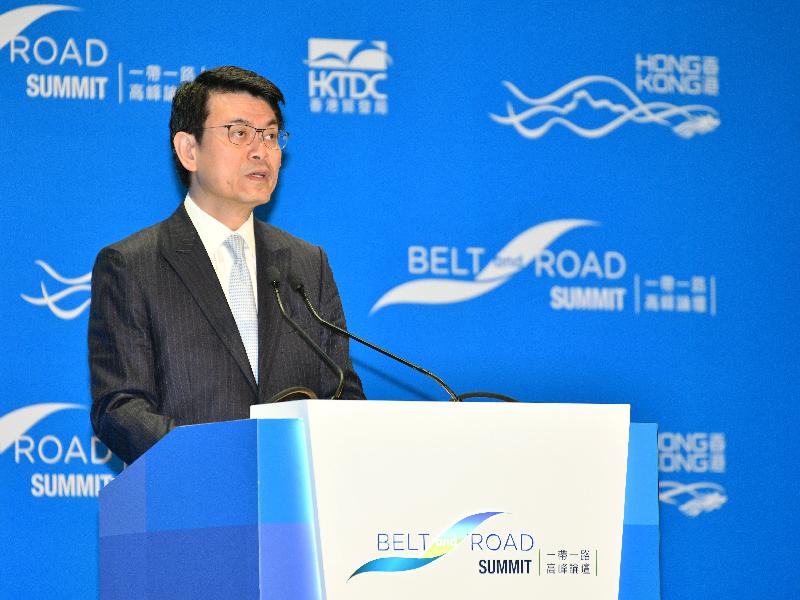Speech by SCED at third Belt and Road Summit (English only) (with photo)
Following is the speech by the Secretary for Commerce and Economic Development, Mr Edward Yau, at the plenary session on “Action through Collaboration: Case Studies on Signature Belt and Road Projects” of the third Belt and Road Summit today (June 28):
Panel Chair Bernard (Convenor of the Non-official Members of the Executive Council, Mr Bernard Chan), panel speakers, ladies and gentlemen,
As the co-host of this summit and on behalf of the Hong Kong Special Administrative Region Government, we welcome once again all of you to come to this first plenary session, in which we will try to home in on Belt and Road actions through collaboration.
I think the signing of the Free Trade Agreement (FTA) between Georgia and Hong Kong just now is indeed a strong testimony of Hong Kong as well as Georgia’s strong commitment and mutual collaborative efforts in pursuing our common interest in facilitating unimpeded trade under the Belt and Road Initiative.
Particularly at the time when we see an overcast of trade protection and the looming storm of trade disputes among some members of the international community, the smooth negotiation and swift conclusion of this Hong Kong-Georgia FTA is a clear and loud message to the world that through collaboration, we can build trade alliance, and through removing trade barriers, we secure mutual benefits that the sum of which is surely bigger than the lone interest of respective players. And we will continue to do more.
Just in the past 12 months, Hong Kong has secured three new sets of FTAs with 12 economies, more than double the number that we have achieved in the last two decades. Our new FTAs range from one with our closest partner, Macao, which is also a partner in forming the greater Bay Area, to a recently signed FTA with the 10 members of ASEAN (Association of Southeast Asian Nations), which is a union that has emerged as Hong Kong’s second largest trading partner in the last decade or so, and just now, with Georgia today, which will become our springboard partner into our respective hinterlands at the two far ends of our big continent of Asia.
What we have witnessed today from the signing of the FTA tells you that Hong Kong connects to countries and economies along the Belt and Road, not just by lip service, but by way of providing binding and trusted agreements that open doors to all, be they markets big or small, old or new.
While these FTAs are signed between Hong Kong and the respective countries and economies, all the market access offered in our FTAs is in fact made available to most if not all companies and businesses that operate in Hong Kong in our typical open, transparent and level-playing field manner.
But what Hong Kong offers is more than just market access. At the press conference of this summit, I mentioned five distinctive areas that Hong Kong could offer itself as a platform for collaboration with all those who want to leverage on the opportunities arising from the Belt and Road Initiative. They are policy, positioning, professional services, project inception and partnering.
For policy, I mean the special institutional arrangement and insights that Hong Kong enjoys with our Central Government as well as governments of all Belt and Road partnering economies. Hong Kong, as a Special Administrative Region of our country, is the first and still the only city that has entered into a collaborative and co-operative arrangement with Beijing over what Hong Kong can do in promoting the Belt and Road Initiative through our own strength.
Again, as a Special Administrative Region, our constitution provides Hong Kong the ability to enter into bilateral and multilateral trade and investment agreements with other economies. All these provide Hong Kong with exceptional government-to-government trade relationships that are in tandem with the rule-based multilateral trading system, i.e. the World Trade Organization.
For positioning, I mean the unique advantages that Hong Kong enjoys under the “one country, two systems” that provides international businesses an exceptional access through Hong Kong into the markets along the Belt and Road. Such advantages include the unique economic freedom, free flow of capital, people and information, and the most welcoming and competitive trading environment that we operate.
For professional services, I mean the availability of a full spectrum of services that are needed in support of global businesses that can operate from Hong Kong. And not only do they benchmark against the highest international standards, they have also acquired the necessary knowledge and skill in handling cross-country, multinational and interdisciplinary transactions.
For project inception, I mean the natural advantage of having Hong Kong as the commercial hub that is the marketplace for deals that are being made. The 200-plus projects that the TDC (Hong Kong Trade Development Council) is putting up on the table today for business matching speaks for itself that Hong Kong is naturally the domain name for Belt and Road projects, and we will continue to develop this depository of Belt and Road projects, as well as the platform for project inception and business matching.
Last but not least, for partnering, it is self-evident that this is exactly what we are doing today in this very place. I hope the coming sessions will offer you many more concrete examples, case studies and stories of successes, and even learning experience that would help us in finding opportunities arising from the Belt and Road Initiative. We believe you have come to the right place at the right time, and I hope to be able to see you and talk to you more during the day. Thank you.


